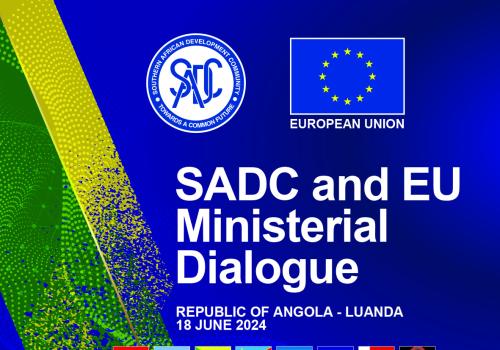A Ministerial Political Dialogue between the Southern African Development Community (SADC) and the European Union (EU) will be held on 18 June 2024, in Luanda, Republic of Angola, where the two parties will engage on issues of mutual interest, including peace and security, human and sustainable development, climate change, environment, trade and investment.
His Excellency Ambassador Téte António, Minister of External Relations of Angola and current Chairperson of the SADC Council of Ministers will co-chair the Dialogue with Hon. Péter Szijjártó, Minister of Foreign Affairs and Trade of Hungary, on behalf of the High Representative of the European Union for Foreign Affairs and Security Policy/ Vice-President of the European Commission Josep Borrell.
The Dialogue serves as a platform to reinforce the relations between SADC and the EU and promote cooperation in peace and security, trade and policies aimed at sustainable economic growth and economic reforms in the SADC Region.
The Dialogue will deliberate on global, continental and regional issues impacting on the peace and security situation of the region and beyond, as well as on development and cooperation. It will take stock of the progress in the implementation of the SADC-EU Cooperation and of the EU-Africa Global Gateway Investment Package.
The two parties will also sign and launch cooperation and financing agreements to support regional programmes on Trade Competitiveness and Market Access; Trade in Services; Natural Resource Management; Safe Digital Boost for Africa; Trade and transport facilitation measures for Strategic Corridors; sustainable food systems; and Institutional support and peace and security.
SADC will be represented by the SADC Secretariat and Double Troika Member States: Angola, Democratic Republic of Congo, Namibia, United Republic of Tanzania, Zambia and Zimbabwe, while the EU will be represented by the European External Action Service (EEAS), by the European Commission and by the EU Delegations to Botswana and SADC, and to Angola. The Ministerial Dialogue will be preceded by the SADC and EU Senior Officials’ Political Dialogue.
The SADC-EU Political Dialogue was launched at the SADC-EU Ministerial Conference in Berlin, Germany, in September 1994, wherein both parties reaffirmed their determination to reinforce their relationship and to establish a comprehensive dialogue.
The Dialogue will be convened in line with a resolution of the SADC-EU Ministerial Dialogue held in March 2013 in Maputo, Mozambique, wherein both parties agreed that the Senior Officials’ Political Dialogue is to be convened annually whilst the Ministerial Political Dialogue is to be held once every two years, with the hosting role alternating between the EU and SADC regions.
The last SADC-EU Ministerial Political Dialogue was virtually held on 16 June 2021, whilst the previous Senior Officials Dialogue was held from 7-8 June 2022 in Brussels, Belgium.
For more information, contact:
For SADC Secretariat: Barbara Lopi, Head of Communication and Public Relations. Email: blopi@sadc.int
For the EU: Pablo Mazarrasa, Responsável de Imprensa e Informação, Delegação da União Europeia em Angola Email: delegation-angola-media@eeas.europa.eu Tel.: +244 222 444236 Ext. 111
For the Republic of Angola: Mr. Joao Fernando De Brino Demba, the SADC National Media Coordinator and Director of Institucional Information and Communication - Ministry of Telecommunication, Information Technologies and Social Communication, email: joao.demba@minttics.gov.ao/joao.demba@gmail.com; telephone, +244 923 718 959
SADC in Brief
SADC is an organisation of 16 Member States established in 1980 as the Southern African Development Coordinating Conference (SADCC) and later, in August,1992 transformed into the Southern African Development Community (SADC). The mission of SADC is to promote sustainable and equitable economic growth and socio-economic development through efficient, productive systems, deeper cooperation and integration, good governance and durable peace and security; so that the region emerges as a competitive and effective player in international relations and the world economy. Member States are Angola, Botswana, Comoros, Democratic Republic of Congo, Eswatini, Lesotho, Madagascar, Malawi, Mauritius, Mozambique, Namibia, Seychelles, South Africa, United Republic of Tanzania, Zambia, and Zimbabwe.
EU in Brief
The European Union (EU) is a unique economic and political union between 27 European countries. The objectives of the EU are to safeguard peace and to ensure economic and social progress through the creation of a European internal market and the strengthening of social cohesion. Over the years, the EU saw its competences expanded through successive treaties. While its vocation was initially primarily economic – with the creation of a huge single market, the European Union has become an eminently political entity. From six founding countries – or Member States – in the 1950s, it has grown into a Union of 27 countries with a population of almost 450 million people, expanding over nearly the whole European continent.

